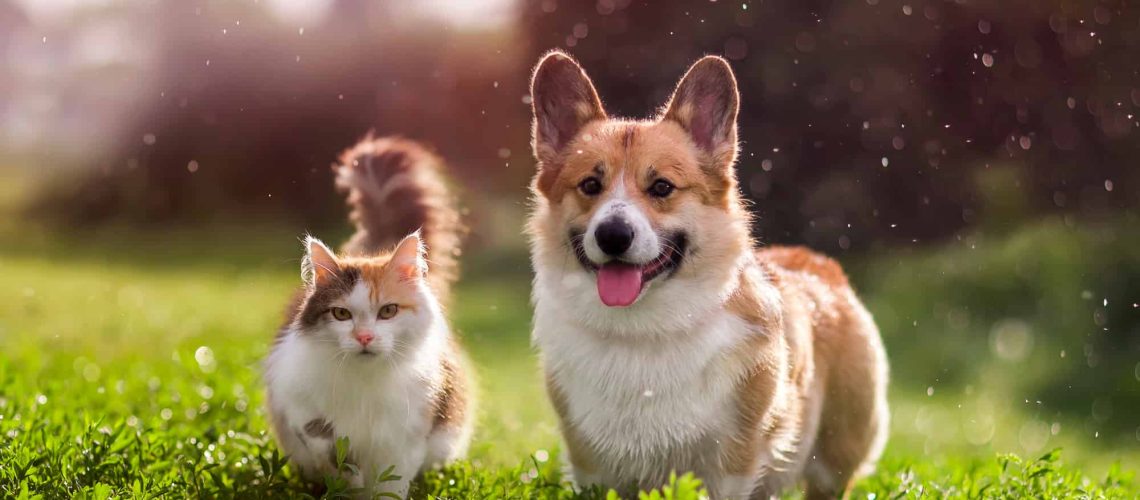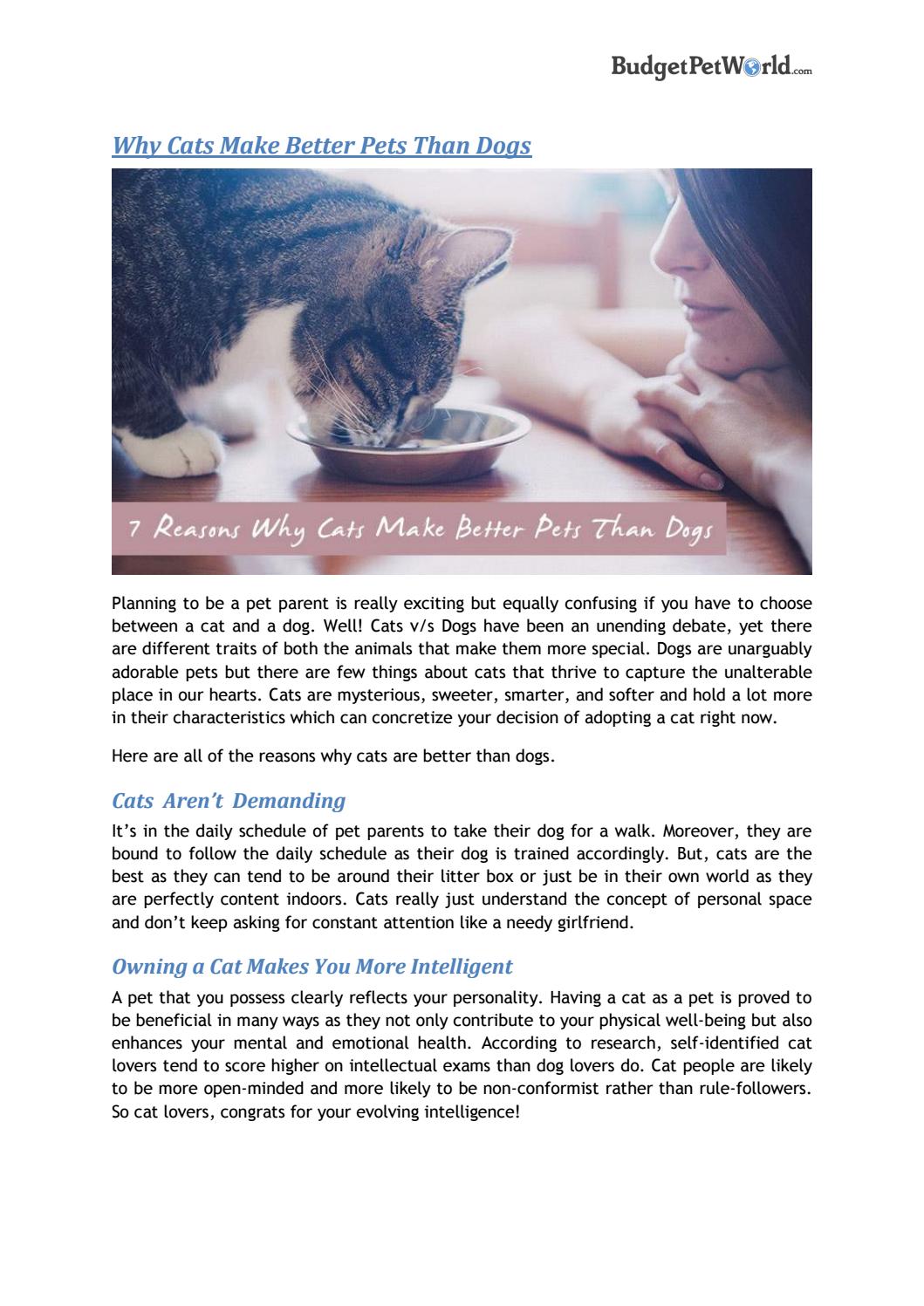Discover the reasons why cats make great pets! They're independent, low-maintenance, and affectionate. Plus, they catch pests, reduce stress, and are perfect for small spaces. Find out why cats need less attention and maintenance than dogs.
Key Takeaways:
1. Cats are more independent than dogs, making them a better choice for busy individuals or those with a less active lifestyle.
2. Cats require less maintenance and are generally easier to care for compared to dogs, as they are naturally clean animals.
3. Cats are quieter than dogs, making them a better option for those who live in apartments or have noise-sensitive neighbors.
4. Cats are generally more adaptable to different living situations and can easily adjust to indoor environments, while dogs may require more space and outdoor activities.
5. Cats have a lower cost of ownership compared to dogs, as they require less food, fewer grooming sessions and fewer visits to the veterinarian.
Reasons why cats make great pets
Cats make great pets for many reasons. First of all, they are very independent animals. Unlike dogs, cats do not need constant attention or to be taken for walks. They are happy to spend time alone and entertain themselves with toys or by exploring their surroundings.
Another reason why cats make great pets is that they are low-maintenance. They clean themselves by licking their fur, so you don't have to give them baths like you would with a dog. Cats also use a litter box to go to the bathroom, so you don't have to take them outside multiple times a day.
Cats are also known for being very affectionate. They may not show it in the same way as dogs, but they can form strong bonds with their owners. They enjoy being petted and cuddled, and some cats even like to sleep in bed with their owners.
The advantages of having a cat as a pet
Having a cat as a pet has many advantages. One advantage is that cats are very good at catching mice and other pests. If you have a problem with mice in your home, getting a cat can help solve the problem without the need for harmful chemicals or traps.
Another advantage of having a cat is that they can provide companionship and reduce stress. Studies have shown that spending time with cats can lower blood pressure and reduce anxiety. Their purring has a calming effect on humans, which can help create a peaceful environment at home.
Cats are also relatively small compared to dogs, making them suitable for people who live in apartments or have limited space. They don't require large yards or extensive exercise like some dog breeds do. This makes them an ideal choice for individuals who may not have the time or ability to take a dog for long walks.
Why cats need less attention and maintenance compared to dogs
Cats require less attention and maintenance compared to dogs for several reasons. One reason is that cats are independent animals. They don't rely on their owners for constant companionship or entertainment. Cats are content with spending time alone and can entertain themselves with toys or by exploring their surroundings.
Another reason is that cats are very clean animals. They groom themselves by licking their fur, which helps keep them clean and reduces the need for regular baths. Cats also use a litter box to go to the bathroom, so you don't have to take them outside multiple times a day like you would with a dog.
Cats also have lower exercise requirements compared to most dog breeds. While dogs often need long walks or runs to burn off energy, cats are more sedentary animals. They enjoy short bursts of playtime but spend most of their day lounging and resting. This makes them suitable for individuals who may not have the time or physical ability to provide extensive exercise for a pet.
How owning a cat can be beneficial for busy schedules or limited space
Owning a cat can be incredibly beneficial for individuals with busy schedules or limited space. Cats are very independent animals and don't require constant attention or entertainment. They are happy spending time alone and can entertain themselves with toys or by exploring their surroundings.
Cats also have lower exercise requirements compared to dogs, making them suitable for individuals with busy schedules. While some dog breeds need long walks or runs every day, cats only require short bursts of playtime to burn off energy. This means that even if you're busy, you can still provide enough exercise and stimulation for your cat without feeling overwhelmed.
In terms of limited space, cats are an ideal pet choice. They don't require large yards or extensive exercise like some dog breeds do. Cats are perfectly content living in apartments or small homes as long as they have access to a litter box and a comfortable place to rest. Their small size and low-maintenance nature make them a great option for individuals who may not have a lot of space to dedicate to a pet.
Ways in which cats are more independent than dogs
Cats are known for their independence, which sets them apart from dogs. One way cats are more independent is that they don't rely on their owners for constant attention or companionship. While dogs often seek out human interaction, cats are content spending time alone and can entertain themselves with toys or by exploring their surroundings.
Another way cats are independent is that they can groom themselves. Cats clean their fur by licking it, which helps keep them clean and reduces the need for regular baths. Dogs, on the other hand, often require more frequent bathing and grooming to maintain cleanliness.
Cats also have a higher tolerance for being alone compared to most dogs. While dogs may experience separation anxiety when left alone for long periods, cats are generally more self-sufficient and can handle being left alone without becoming overly distressed. This makes them suitable pets for individuals who have busy schedules or need to be away from home for extended periods.
Cat characteristics that make them suitable for people with allergies
Many people believe that they cannot own pets due to allergies, but cats can be a great option for individuals with allergies. One reason is that cat allergens tend to be less airborne compared to dog allergens. This means that even if you're allergic to cats, you may still be able to live comfortably with one as long as you manage your environment properly.
Another reason why cats can be suitable for people with allergies is that some cat breeds produce fewer allergens than others. Certain breeds, such as the Siberian or the Balinese, are known to produce lower levels of allergens and may cause fewer allergic reactions in sensitive individuals.
It's also important to note that regular grooming and cleaning can help reduce allergens in the home. Brushing your cat regularly and keeping their living area clean can minimize the amount of dander and allergens present. Additionally, using air purifiers or HEPA filters can help remove allergens from the air, creating a more allergy-friendly environment.
How cats create a calm and stress-free environment at home
Cats have a unique ability to create a calm and stress-free environment at home. One way they do this is through their purring. The sound of a cat's purr has been shown to have a calming effect on humans. It can help reduce stress and anxiety, creating a peaceful atmosphere in the home.
Cats also have a calming presence due to their independent nature. They don't require constant attention or interaction like some other pets do. Their ability to entertain themselves and find contentment in solitude can be soothing for their owners, especially after a long day.
Additionally, watching cats play or engage in their daily routines can be relaxing and entertaining. Their graceful movements and playful antics can provide moments of joy and amusement, further contributing to a calm and stress-free environment at home.
The low-maintenance nature of cats makes them ideal pets for the elderly or those with disabilities
Cats are an ideal choice for the elderly or individuals with disabilities due to their low-maintenance nature. Cats are generally independent animals that don't require constant attention or physical activity. This makes them suitable companions for individuals who may have limited mobility or energy.
Cats also have lower exercise requirements compared to dogs, which can be beneficial for the elderly or those with disabilities. While some dog breeds need long walks or runs every day, cats only require short bursts of playtime to burn off energy. This means that individuals with limited mobility can still provide enough exercise and stimulation for their cat without feeling overwhelmed.
In addition, cats can provide emotional support and companionship to the elderly or individuals with disabilities. Their presence can help alleviate feelings of loneliness and provide a sense of purpose and responsibility. The low-maintenance nature of cats makes it easier for them to fit into the daily routines and lifestyles of these individuals.
Why cats are suitable for individuals who prefer a quieter and less active lifestyle
Cats are a perfect choice for individuals who prefer a quieter and less active lifestyle. Unlike dogs, cats don't require constant attention or physical activity. They are content spending time alone and can entertain themselves with toys or by exploring their surroundings.
Cats also have lower exercise requirements compared to most dog breeds. While dogs often need long walks or runs to burn off energy, cats are more sedentary animals. They enjoy short bursts of playtime but spend most of their day lounging and resting. This makes them an ideal pet choice for individuals who may not have the energy or desire for extensive exercise.
In addition, cats tend to be quieter than dogs. While some dog breeds are known for barking loudly, cats generally communicate through softer sounds like meowing or purring. This can create a more peaceful environment at home, especially for individuals who value tranquility and serenity.
Why cats are better pets than dogs?
Cats are low-maintenance compared to dogs. They groom themselves, don't require walks or outdoor bathroom breaks. Cats don't need formal training and can keep themselves entertained.
Why is cat the best pet?
Cats have the unique ability to both relax your nervous system and offer instant entertainment and play. Despite their independent nature and preference for exploring on their own, cats are also extremely affectionate towards their owners and those they trust.
What can cats do that dogs can t?
Although dogs have inferior vision compared to cats, cats have the ability to detect rapid movements nearby due to their superior vision, which is advantageous for hunting. Additionally, cats possess unique adaptations that enhance their ability to see in low-light conditions, surpassing the visual capabilities of humans and dogs, as stated by Dr. Grace C. on January 20, 2021.
What's better a dog or a cat?
If you desire a pet that is obedient and respectful, a dog may be the preferable option. However, owning a cat has its own benefits, such as their independence and low maintenance. One could argue that a cat's personality is more similar to that of a human, as they experience a broader range of emotions compared to dogs.
Why cats are good for mental health?
Cats are incredibly loving and affectionate creatures, and simply being around them can have a positive impact on our mental well-being. Their presence can help reduce stress, provide companionship, heal through their soothing purrs, and they can even serve as therapy animals, making them excellent advocates for mental health.
Why are cats superior pets?
Cats are easy to take care of since they don't need to be trained, taken out for walks multiple times a day, and can clean themselves. Although long-haired cats may need regular grooming, it is generally less frequent than for long-haired dogs.

















